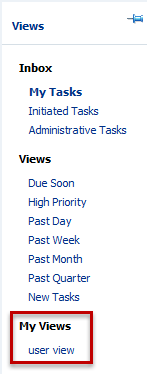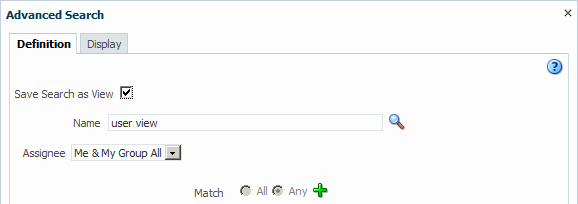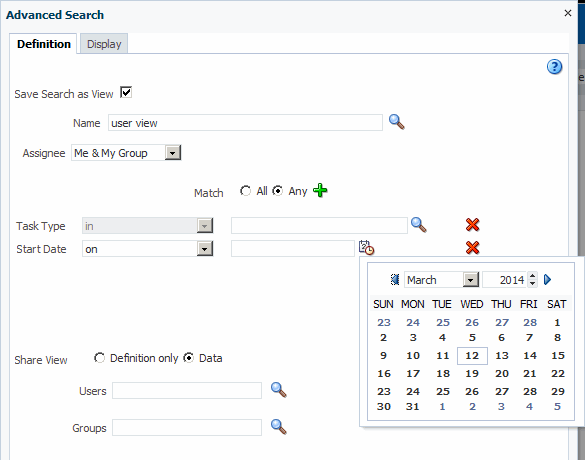- Developing SOA Applications with Oracle SOA Suite
- Using the Human Workflow Service Component
- Using Oracle BPM Worklist
- Customizing the Task List Page
- How To Filter Tasks
- To Filter Tasks Based on an Advanced Search
To Filter Tasks Based on an Advanced Search
To filter tasks based on an advanced search:
Mapped attribute labels can be used in an advanced search if you select task types for which mapped attribute mappings have been defined.
See How To Map Attributes, for more information.
- Click Advanced.
- (Optional) Check Save Search As View, provide a view name, and use the Display tab to provide other information, as shown in Figure 32-5 and Figure 32-6.
Figure 32-5 Worklist Advanced Search—Definition Tab
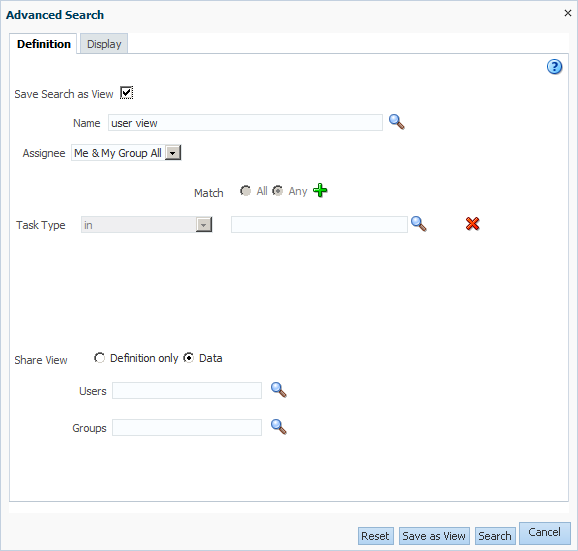
Description of "Figure 32-5 Worklist Advanced Search—Definition Tab"Figure 32-6 Worklist Advanced Search—Display Tab
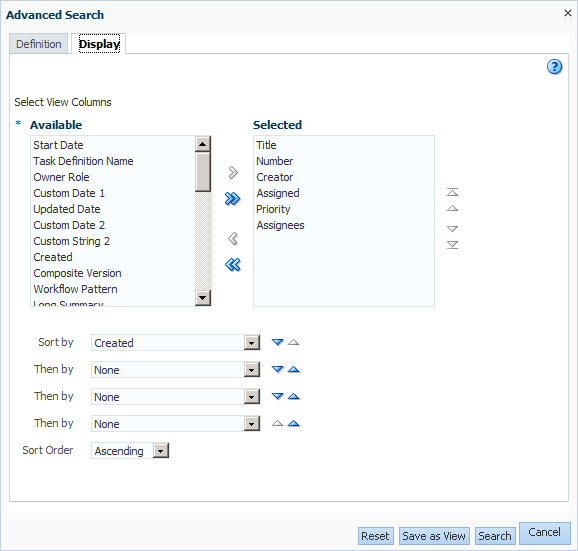
Description of "Figure 32-6 Worklist Advanced Search—Display Tab"Table 32-4 describes the advanced search view columns available in the Display tab.
Table 32-4 Advanced Search—View Columns
Column Description Start Date
The start date of the task (used with ToDo tasks).
Task Definition Name
The name of the task component that defines the task instance.
Owner Role
The application role (if any) that owns the task instance. Task owners can be application roles, users, or groups. If the owner of the task is an application role, this field is set.
Updated Date
The date the task instance was last updated.
Composite Version
The version of the composite that contains the task component that defines the task instance.
Creator
The name of the creator of the task.
From User
The from user for the task.
Percentage Complete
The percentage of the task completed (used with ToDo tasks).
Owner Group
The group (if any) that owns the task instance. Task owners can be application roles, users, or groups. If the owner of the task is a group, this field is set.
End Date
The end date of the task (used with ToDo tasks).
Composite
The name of the composite that contains the task component that defines the task instance.
Due Date
The due date of the task (used with ToDo tasks).
Composite Distinguished Name
The unique name for the particular deployment of the composite that contains the task component that defines the task instance.
Task Display URL
The URL to display the details for the task.
Updated By
The user who last updated the task.
Outcome
The outcome of the task, for example Approved or Rejected. This is only set on completed task instances.
Task Namespace
A namespace that uniquely defines all versions of the task component that defines this task instance. Different versions of the same task component can have the same namespace, but no two task components can have the same namespace.
Approvers
The approvers of the task.
Application Context
The application to which any application roles associated with the tasks (such as assignees, owners, and so on) belong.
Owner User
The user (if any) that owns the task instance. Task owners can be application roles, users, or groups. If the owner of the task is a user, this field is set.
Identifier
The (optional) custom unique identifier for the task. This is an additional unique identifier to the standard task number.
Category
The category of the task.
Acquired By
The name of the user who claimed the task in the case when the task is assigned to a group, application role, or to multiple users, and then claimed by the user.
Component
The name of the task component that defines the task instance.
Original Assignee User
The name of the user who delegated the task in the case when the user delegates a task to another user.
Assigned
The date that this task was assigned.
Partition
The domain to which the composite that contains the task component that defines the task instance belongs.
Title
The title of the task.
Number
An integer that uniquely identifies the task instance.
Priority
An integer that defines the priority of the task. A lower number indicates a higher priority—typically numbers 1 to 5 are used.
Assignees
The current task assignees (users, groups or application roles).
State
The state of the task instance.
Created
The date that the task instance was created.
Expires
The date on which the task instance expires.
Custom Date 1
Custom flex field 1 with Date data type
Custom Date 2
Custom flex field 2 with Date data type
Custom String 1
Custom flex field 1 with String data type
Custom String 2
Custom flex field 2 with String data type
Custom Number 1
Custom flex field 1 with Number data type
Custom Number 2
Custom flex field 2 with Number data type
The saved view appears in the Views pane under My Views, as shown in Figure 32-7.
Note:
When a user view is created, and there are multiple versions of the same composite deployed, then selecting the task type with a particular version, for example, 'TestCompositeHumanTask2.0 ' does not ensure that only the tasks corresponding to this version are filtered. Instead use the task definition id column in the conditions, apart from selecting the task type, to get the correct result.
- Select an assignee, as shown in Figure 32-8.
- Add conditions (filters), as shown in Figure 32-9.
Figure 32-9 Adding Filters for an Advanced Search on Tasks
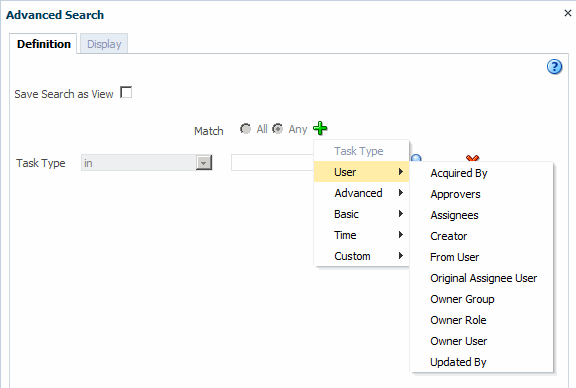
Description of "Figure 32-9 Adding Filters for an Advanced Search on Tasks"Table 32-5 describes the available conditions.
Table 32-5 Advanced Search—Conditions
Condition Description User Conditions
-
Acquired By
The name of the user who claimed the task in the case when the task is assigned to a group, application role, or to multiple users, and then claimed by the user.
Approvers
The approvers of the task.
Creator
The name of the creator of the task.
From User
The from user for the task.
Original Assignee User
The name of the user who delegated the task in the case when the user delegates a task to another user.
Owner Group
The group (if any) that owns the task instance. Task owners can be application roles, users, or groups. If the owner of the task is a group, this field is set.
Owner Role
The application role (if any) that owns the task instance. Task owners can be application roles, users, or groups. If the owner of the task is an application role, this field is set.
Owner User
The user (if any) that owns the task instance. Task owners can be application roles, users, or groups. If the owner of the task is a user, this field is set.
Updated By
The user who last updated the task.
Advanced Conditions
-
Application Context
The application to which any application roles associated with the tasks (such as assignees, owners, and so on) belong.
Component
The name of the task component that defines the task instance.
Composite
The name of the composite that contains the task component that defines the task instance.
Composite Distinguished Name
The unique name for the particular deployment of the composite that contains the task component that defines the task instance.
Composite Version
The version of the composite that contains the task component that defines the task instance.
Partition
The domain to which the composite that contains the task component that defines the task instance belongs.
Task Display URL
The URL to display the details for the task.
Basic Conditions
-
Category
The category of the task.
Identifier
The (optional) custom unique identifier for the task. This is an additional unique identifier to the standard task number.
Number
An integer that uniquely identifies the task instance.
Outcome
The outcome of the task, for example Approved or Rejected. This is only set on completed task instances.
Percentage Complete
The percentage of the task completed (used with ToDo tasks).
Priority
An integer that defines the priority of the task. A lower number indicates a higher priority; typically numbers 1 to 5 are used.
State
The state of the task instance.
Task Definition Name
The name of the task component that defines the task instance.
Task Namespace
The namespace of the task.
Title
The title of the task.
Time Conditions
The category of the task.
Assigned
The date that this task was assigned.
Created
The date that the task instance was created.
Due Date
The due date of the task (used with ToDo tasks).
End Date
The end date of the task (used with ToDo tasks).
Expires
The date on which the task instance expires.
Start Date
The start date of the task (used with ToDo tasks).
Updated Date
The date that the task instance was last updated.
Custom Conditions
-
Custom Date 1
Custom flex field 1 with Date datatype
Custom Date 2
Custom flex field 2 with Date datatype
Custom String 1
Custom flex field 1 with String datatype
Custom String 2
Custom flex field 2 with String datatype
Custom Number 1
Custom flex field 1 with Number datatype
Custom Number 2
Custom flex field 2 with Number datatype
- Select Any or All for matching multiple filters.
- Add parameter values, shown in Figure 32-10.
- Specify whether to share either this view's definition or its data, and the users or groups to share it with.
- Click Search.
The task list appears with the tasks filtered according to your criteria.
